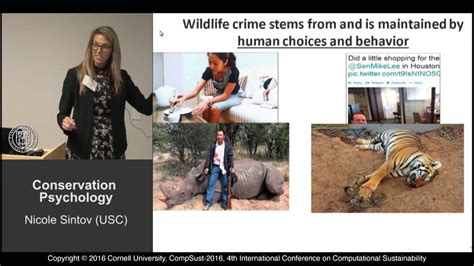Conservation Psychology Matters

The natural world has long been a source of fascination and inspiration for humans, with its intricate web of relationships and complex ecosystems. However, as the world grapples with the challenges of climate change, deforestation, and species extinction, it has become clear that a new approach is needed to protect the environment. This is where conservation psychology comes in – a field that seeks to understand the psychological factors that drive human behavior towards the natural world, and to develop strategies for promoting conservation and sustainability.
At its core, conservation psychology is about understanding the complex relationships between humans and the natural world. It recognizes that humans are not separate from nature, but a part of it, and that our actions have a profound impact on the environment. By studying the psychological factors that influence human behavior towards the environment, conservation psychologists aim to develop effective strategies for promoting conservation and sustainability.
One of the key insights of conservation psychology is that humans have a deeply ingrained emotional connection to nature. This connection is often referred to as “biophilia,” or the love of nature, and it is thought to be an evolutionary adaptation that helped our ancestors to thrive in their environments. However, as humans have become increasingly urbanized and disconnected from nature, this emotional connection has been eroded, leading to a decline in environmental values and behaviors.
Conservation psychologists have developed a range of strategies for promoting conservation and sustainability, including education and outreach programs, community-based initiatives, and policy interventions. For example, studies have shown that people who are given the opportunity to experience nature firsthand, through activities such as hiking or wildlife watching, are more likely to develop pro-environmental values and behaviors. Similarly, community-based initiatives that involve local people in conservation efforts have been shown to be highly effective in promoting sustainability and protecting biodiversity.
Conservation psychology is not just about promoting environmental values and behaviors, but also about understanding the psychological factors that drive human behavior towards the natural world. By recognizing the complex relationships between humans and the environment, we can develop more effective strategies for promoting conservation and sustainability.
Despite the importance of conservation psychology, it remains a relatively underdeveloped field. However, as the world continues to grapple with the challenges of environmental degradation and climate change, it is clear that conservation psychology has a critical role to play. By developing a deeper understanding of the psychological factors that drive human behavior towards the natural world, we can create more effective strategies for promoting conservation and sustainability, and for protecting the natural world for future generations.
The Importance of Conservation Psychology in Practice

Conservation psychology is not just a theoretical field, but also a practical one. It has a wide range of applications, from conservation efforts to environmental policy. For example, conservation psychologists have worked with conservation organizations to develop effective strategies for promoting conservation and sustainability, such as education and outreach programs, community-based initiatives, and policy interventions.
One of the key challenges in conservation psychology is developing effective strategies for promoting pro-environmental behaviors. This can be achieved through a range of approaches, including education and outreach programs, community-based initiatives, and policy interventions. For example, studies have shown that people who are given the opportunity to experience nature firsthand, through activities such as hiking or wildlife watching, are more likely to develop pro-environmental values and behaviors.
Pros and Cons of Conservation Psychology
- Pros:
- Develops effective strategies for promoting conservation and sustainability
- Recognizes the complex relationships between humans and the environment
- Has a wide range of applications, from conservation efforts to environmental policy
- Cons:
- Remains a relatively underdeveloped field
- Can be challenging to develop effective strategies for promoting pro-environmental behaviors
- Requires a deep understanding of the psychological factors that drive human behavior towards the natural world
Future Directions for Conservation Psychology

As the field of conservation psychology continues to evolve, there are a number of future directions that it may take. One of the key areas of focus is likely to be the development of more effective strategies for promoting pro-environmental behaviors. This may involve the use of new technologies, such as social media and virtual reality, to engage people with environmental issues and promote sustainability.
Another area of focus is likely to be the integration of conservation psychology with other fields, such as ecology and economics. By recognizing the complex relationships between humans and the environment, conservation psychologists can work with ecologists and economists to develop more effective strategies for promoting conservation and sustainability.
Steps for Promoting Conservation and Sustainability
- Develop a deeper understanding of the psychological factors that drive human behavior towards the natural world
- Recognize the complex relationships between humans and the environment
- Develop effective strategies for promoting pro-environmental behaviors, such as education and outreach programs, community-based initiatives, and policy interventions
- Integrate conservation psychology with other fields, such as ecology and economics
- Use new technologies, such as social media and virtual reality, to engage people with environmental issues and promote sustainability
What is conservation psychology?
+Conservation psychology is the study of the psychological factors that drive human behavior towards the natural world, with the goal of developing effective strategies for promoting conservation and sustainability.
Why is conservation psychology important?
+Conservation psychology is important because it recognizes the complex relationships between humans and the environment, and seeks to develop effective strategies for promoting conservation and sustainability.
What are some of the applications of conservation psychology?
+Conservation psychology has a wide range of applications, from conservation efforts to environmental policy. It can be used to develop effective strategies for promoting pro-environmental behaviors, and to integrate conservation efforts with other fields, such as ecology and economics.
In conclusion, conservation psychology is a critical field that seeks to understand the psychological factors that drive human behavior towards the natural world. By recognizing the complex relationships between humans and the environment, conservation psychologists can develop effective strategies for promoting conservation and sustainability. As the world continues to grapple with the challenges of environmental degradation and climate change, the importance of conservation psychology is likely to grow, and it will play a critical role in protecting the natural world for future generations.



